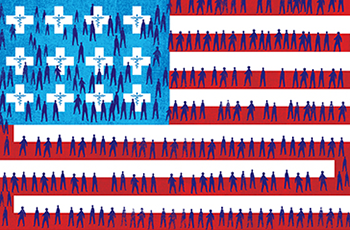During their third-year OB/GYN rotation, a group of medical students at the George Washington University (GW) School of Medicine and Health Sciences (SMHS) filtered through the mock-exam rooms of the Clinical Learning And Simulation Skills Center (CLASS Center). The standardized patients, or “SPs,” they met — actors taking on temporary roles — discussed typical maladies and conditions an OB/GYN would potentially diagnose. One patient, however, was different. This SP was a sexual assault survivor.
“That one single SP encounter [stood out] because I was so caught off guard,” recalls Billy Vintzileos, now a fourth-year medical student. He and the cluster of students who worked with the SP came away feeling unsettled and wanted to learn how to do more to help sexual assault survivors. “It was a curveball,” explains Rebecca Surrey, a fellow fourth-year MD student. “Now as residents, we’re going to be the ones to provide that medical care, and we are the ones people ask for help, so we should know what to do.”

Motivated by the opportunity to enrich training for future classes, Surrey and Vintzileos, along with a handful of their classmates, seized on the topic of sexual assault training for medical providers, primarily through curriculum implementation, for their Clinical Public Health Summit project. The yearlong projects, explains Lawrence “Bopper” Deyton, MD ’85, MSPH, senior associate dean for clinical public health and Murdock Head Professor of Medicine and Health Policy at SMHS, build on the summits that students participate in throughout their first three years of medical school. The goal is for students to learn how, as clinicians, they can take active roles in public and community health issues to tackle complex problems, such as childhood asthma, obesity, and HIV/AIDS. They are tasked with creating solutions and presenting them to experts, sometimes with real consequences; student proposals from the 2015 HIV/AIDS summit, for example, were included in Washington, D.C.’s, new HIV/AIDS Action Plan. It was the students, as well, who proposed picking their own topics for their culminating Clinical Public Health Summit; Deyton said yes. “To be able to choose a topic, especially one in their chosen specialty, and work on it for a full year has particular salience for the rest of their careers,” he explains. Topics included traumatic brain injuries in children and the opioid crisis, and individual projects were, in large part, sparked by personal experiences. Cate Mackenzie, for example, a nurse before enrolling in medical school, wanted to build on her experience keeping patients mobile. “We know that’s really important for patients to prevent complications of hospitalization,” she says. “There’s a rule of thumb that for people over the age of 65, every day in bed requires about a week of recovery for them to get back to their baseline.” Her interventions include adding mobility boards for both patients and providers in hospital rooms, installing more handrails in the hallways of GW Hospital, and training medical students on how to mobilize patients. Education was also a critical part of Mary Piechowiak’s project. Climate change, she says, can directly impact health; for instance, an increase in temperature is linked to more kidney stones and can negatively affect outcomes in patients with diabetes, cardiovascular disease, and obesity. Professional medical organizations have issued statements on the correlation, and the American College of Physicians offers a tool kit, but, she says, “in medical education, there isn’t a lot of incorporation of climate change.” Her aim, inspired by her participation in last year’s Women’s March and the March for Science, is to enact change from the ground up. She’s gathering potential data on folding climate change into the medical curriculum, and she’s hoping to meet with leadership once her research is complete. “A year ago I knew a little bit, but compared to now, I didn’t know anything about how climate change affects health. I hope it gets into the curriculum,” she says. “One of the things I’m planning to do is come up with my own PowerPoint [presentation] so that next year when I go into residency … I have something I can share with my peers and teach them about climate change.” The presentations, says Kaylan Baban, MD, MPH, assistant professor of medicine at SMHS and lead faculty member of the summit, were inspiring — and they illustrated that all clinicians can take a direct, active role in public health. “There is no specialty that does not have areas of significant relevance for our broader public health conversation,” Baban says. “It’s thrilling to see this understanding taking root in real time, and hopefully the relevance of clinical public health … will not even be a second thought for these students in the future.”



